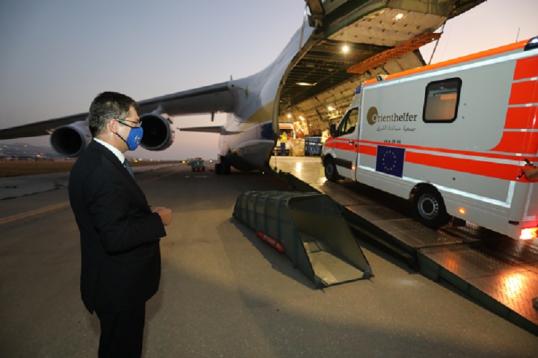One year ago, I began my mandate as European Commissioner for Crisis Management with a simple purpose in mind: to help alleviate the suffering of the most vulnerable and provide assistance to people whose lives have been turned upside down by disasters, crises and conflicts. Throughout the year, not a day has gone by when I was not reminded of the value of collective solidarity in achieving this ambition.
The first year of my mandate was largely driven by Covid-19 – a global health emergency that required an unprecedented response both within and outside the European Union. As we sought to swiftly address the immediate and pressing challenges arising from the pandemic, we equally faced a series of separate crises – the tragic earthquakes in Croatia and Albania remain particularly vivid in our minds to this day.
No one country, no matter how big, could resolve such crises on their own. That is why the European Union has sought to foster greater cooperation, both at home and globally.
EU Solidarity at Home
Despite difficult circumstances and global constraints, the Union Civil Protection Mechanism continued to serve as the benchmark for European solidarity. When flights were suspended and borders started to close across the globe, the Mechanism helped with the repatriation of over 82,000 EU citizens. With record 98 activations in 2020 so far, the Mechanism has again proven its worth in providing assistance in emergencies worldwide.
Nevertheless, there was a point where the pandemic also challenged our Civil Protection Mechanism. One of the most striking issues to arise at the start of the pandemic related to the scarcity of personal protective equipment and other vital medical supplies worldwide. In response, the EU quickly embarked on a series of practical steps to ensure that no Member State would ever fall behind in case all of them were overwhelmed by the same crisis. We established a new rescEU reserve for life-saving medical equipment – a pool of resources to be distributed to the Member States hit hardest by a medical emergency as a safety net of last resort. We also proposed a new revision of the Union Civil Protection Mechanism, strengthening it financially and enhancing it operationally by introducing more flexibility in order to act at Union level in support of our Member States. With this, we can ensure that our civil protection mechanism remains fit-for-purpose, so that we can successfully address tomorrow’s problems.
EU Solidarity around the World
As we sought to address challenges at home, the EU did not lose sight of its global commitments. Together with our Member States, we continued to support millions of people across the world, contributing almost €1.8 billion in humanitarian aid to the most fragile regions. This includes €441 million, mobilized specifically to address the impact of Covid-19, in areas such as health, water and sanitation, or protection. We have put a particular emphasis on continuing our support for the education of children in emergencies, and on addressing the impact of crises on women and girls.
In view of the challenges in delivering aid this year, we established the EU Humanitarian Air Bridge operation – an initiative to facilitate the temporary delivery of relief items in times of COVID-19 around the world. Over the space of four months, we organized 67 flights, supporting the delivery of more than 1,150 tonnes of essential medical and humanitarian cargo and the deployment of hundreds of humanitarian and medical personnel. Through this initiative, we provided much-needed support to 20 countries in all regions of the world, including some of the worst humanitarian crises across the globe. The EU Humanitarian Air Bridge proved to be much more than just a logistical tool. It was a concrete showcase of EU unity in action, our collective solidarity – and working closely with our Member States and humanitarian partners was a key to its success.
Despite Covid-19 related restrictions, our Union Civil Protection Mechanism delivered also abroad. In the aftermath of the devastating blasts in Beirut, the first EU rescue teams were on the ground in a matter of a few hours, whereby the Commission managed to swiftly mobilise more than €64 million for first emergency needs and protection of critical infrastructure.
Pursuing Solidarity Further
Over the past twelve months, every one of the steps we have taken together with my colleagues and our partners was dedicated to finding solutions to the new challenges posed by this unprecedented global health emergency. Looking back on a year that tested all of us to our limits, we can however also say with some confidence that 2020 was a year when the EU’s collective capacity to respond to crises was taken to a higher level. As we look to the future, in a world confronted with the lasting fall-out from Covid-19, particularly for the most vulnerable people, I will continue to work towards strengthening our collective response also during the next years of my mandate
Details
- Publication date
- 30 November 2020
- Author
- Directorate-General for Communication

